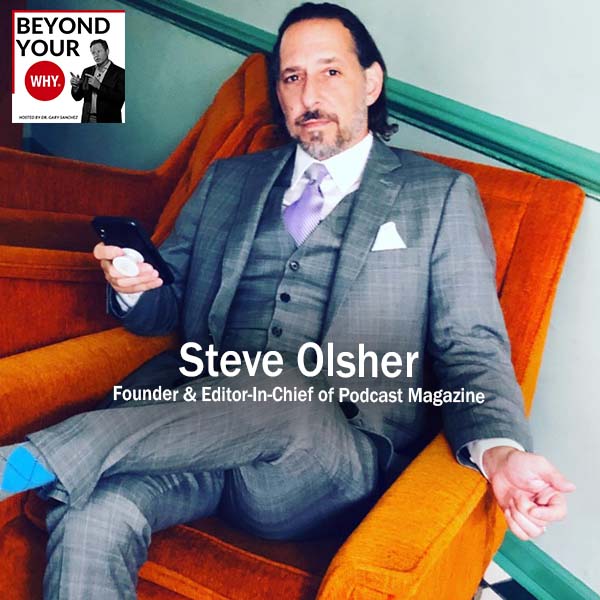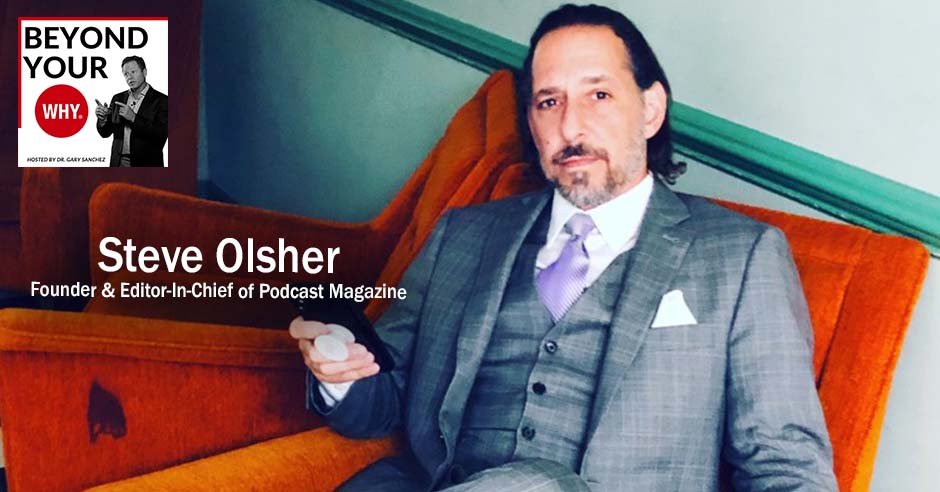
People don’t often realize that the art of deejaying is a great example of the WHY of Contribute. DJs are like the conductors of a party. They have the ability to impact and influence mindset and behavior based on your actions. They want to be part of something great without being in the middle of it. They are the life of the party, but they also need to be empathetic. They need to understand their crowd to really have something spectacular. Join Dr. Gary Sanchez as he talks to Steve Olsher about how a DJ can really get positive energy from their crowd. Besides being a nightclub DJ, Steve is also the founder and Editor-In-Chief of Podcast Magazine®. He is also the founding Chairman of Liquor.com and the author of What Is Your WHAT? Discover how Steve found interest in the nightclub scene and how his passion for music brought him to deejaying. Learn how you can affect people’s collective mood with the power of music. Find out what Steve’s ultimate goal is and why you need to plan your life accordingly.
—
Watch the episode here
Listen to the podcast here
The Art Of Deejaying: How A DJ Can Touch Your Soul With Steve Olsher
In this episode, we’re going to be talking about the why of contribute. To contribute to a greater cause, add value or have an impact on the lives of others. If this is your why, then you want to be part of a greater cause, something that is bigger than yourself. You don’t necessarily want to be the face of the cause but you want to contribute to it in a meaningful way. You love to support others and relish the success of the greater good. You see group victories as personal victories. You are behind the scenes looking for ways to make the world better. You make a reliable and committed teammate and often act as the glue that holds everyone else together. You use your time, money, energy, resources and connections to add value to other people and organizations.
I’ve got a great guest for you. His name is Steve Olsher. He is the Founder and Editor in Chief of Podcast Magazine, Creator of ClubPod on Clubhouse, the largest podcast group on all social media platforms. He’s the creator of Pod Expo. Original Chairman and Founder of Liquor.com. He is also an online pioneer, who launched CompuServe’s electronic mall in 1993 and the New York Times bestselling author of What Is Your WHAT? Discover The One Amazing Thing You Were Born to Do.
He’s a real estate developer and creator of the New Media Summit. He’s the host of the number one rated podcast, Reinvention Radio. He’s an international keynote speaker and an independent media guest who has appeared on CNN, the Huffington Post, the cover of Founder Magazine and countless other media outlets. Steve, welcome to the show.
Thanks. I appreciate you having me.
That is quite a resume right there. Take us back through your life a little bit. Where were you born? What were you like as a kid growing up? Take us on your path on how you got to where you are now because that’s a lot of different things that you’ve done.
I was born in Chicago and raised in Evanston and Skokie, North of Chicago. Even from a young age, I’ve been pretty entrepreneurial. I always tried to figure out how to rev a couple of dimes together and make a quarter. For as long as I can remember, I was doing things like raking leaves, shoveling sidewalks and driveways and doing whatever I could to try to put some money in my pocket.
It started from a young age of doing the entrepreneurial stuff and that led to music and deejaying. I opened my nightclub when I was nineteen. I then got involved in the catalog world very early and the dot-com, real estate, writing, speaking, podcasting and doing live events. My wife and I own a funeral home here in San Diego.
You started doing a lot of different things from a very young age. Why was that important to you back then? When you think back to those days, what was your motivation to jump in so early and start making money?
There was altruistic thinking behind that or something that’s a little more palatable but at the end of the day, it boils down to scarcity. After my parents got divorced, we had to get out of the big house that we lived in and then watch mom struggle and do what she had to do. There was a lot of scarcity talk. My stepfather came on when I was ten and was like, “Don’t set the thermostat above 68 degrees. We can’t buy this or that.” There was a lot of scarcity that went hand in hand there. I want to make sure that if push comes to shove at least add a few dollars if need be.
At that time, were you contributing to the family or was it mostly from you?
[bctt tweet=”While everybody at a party is spending money, the DJ is there making money.” username=”whyinstitute”]
It wasn’t that formalized but it was more of a mindset, things that kicked in like, “This is what I need to start thinking about. How do I take care of myself? If need be, help out with mom and the family.” Generally speaking, we had enough to get by but I always felt like we needed a little bit more. I’m not sitting here saying I went without meals because I didn’t but I felt like it always would be good to have a little more on hand.
For those of you that are regular readers, Steve did his YOS, which is his why, how and what. Steve’s why is to contribute to a greater cause but how he goes about doing that is by challenging the status quo and doing things differently. Not following the typical or traditional but following his path. Ultimately, what he brings are solutions that make sense and doable and get results. You didn’t follow a typical path like, “I’m going to go to school, play on the sports teams, run off to college and do the fraternity deal and all the rest.”. You did your thing.
I did go to school. I wasn’t much of an athlete. I entered a few things here and there but I’d mess around and play basketball or those sorts of things with friends but I wasn’t starting on the varsity squad or playing any of those games at a higher level. I did know that I wanted to go to college. Mostly, to have the college experience and get out of the house was the thing.
I remember sitting down with my guidance counselor in high school and we were talking about going to college. She was giving me all the examples of the different schools and different types of schools. I remember her talking about how, if you pay in-state tuition, you can pay a lot less. We live in Illinois. If I went to a school in Illinois somewhere, it’ll be a lot cheaper than going to a school in Michigan, Ohio, California or wherever else. I was like, “What are my options?”
She started going through some stuff and then talked about Southern Illinois University at Carbondale, which was about 330 miles or so from Chicago. She said that SIU, Southern Illinois University, is farther away from home than any of the big ten schools and you can still pay in-state tuition. I was like, “That’s cool. I can go far away and farther than any of the big ten schools and still pay in-state tuition. Sign me up.” That’s why I chose SIU. It was far and I could pay in-state tuition.
Isn’t weird the reasons we pick the schools that we go to? I went to the University of Colorado-Boulder because some of my friends that I had fun with went there for no other reason. I went up and hung out with them. I was like, “This seems like a lot of fun so I’m going to go here.” It turned out okay. What did you study while you were in SIU?
I studied nightclubs because I DJ’ed in a lot of nightclubs. I studied Speech Communications and had a minor in Journalism.
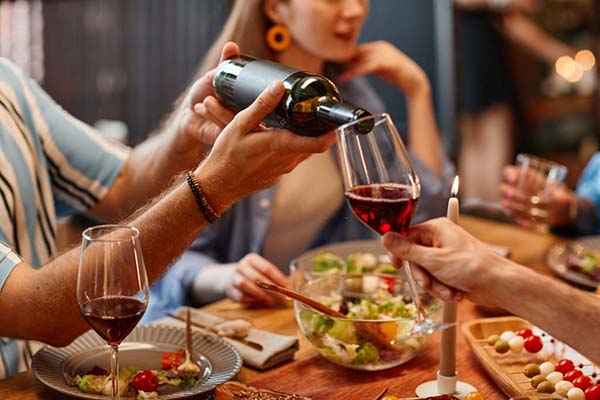
What you were doing is figuring out the nightclub world?
A little bit. I was enjoying deejaying and I liked being a part of the party without being in the middle of the party. It was my opportunity and way to be there without having to be in the middle of it while everybody else was spending money. I was there making money.
What got you in deejaying?
I played drums for nine years. I’ve always loved music and rhythm. It’s always been a big part of who I am. After I got wind of the whole DJ scene, I was like, “This is something that I want to be doing.” I traded in my drums for some turntables and started buying records. Back in the day, we had the vinyl and carried it around. It was a little different than it is now with the USB but there you have it.
You started deejaying at the different clubs. Take us through what happened after that. This is while you were in school?
It was. I DJ’ed in several clubs during college. By the time I hit my senior year, I built up a pretty decent following and it seemed like, “This is something I should do,” in terms of, contemplating having my spot because I would play and the folks would show up. I was like, “Maybe I’ll open up my spot.” At nineteen, I put together the business plan, went out and raised money and opened up a non-alcoholic nightclub, which seemed to make a lot of sense because all the bars had to close early because they served alcohol. For the folks who didn’t want to go home at 1:30 or 2:00, they had a place to go. We cover the charge for non-alcoholic drinks and some food. We did pretty well for a while.
What happened to you after that?
[bctt tweet=”There’s nothing quite like being in unison with the crowd. That positive energy can really change lives.” username=”whyinstitute”]
From there, I ended up going back to Chicago. My mom invited me to come and join the family business. My grandfather had started Foremost Liquor stores back in the ’40s. I knew that the family business needed some help. It wasn’t my first choice in terms of, “This is what I want to do for a career.” I didn’t have any love for the liquor business. I’m not a big drinker. I haven’t been a big drinker ever.
I saw that was an opportunity there to help grow things. There was a small piece of the puzzle, which was called Foremost Liquor by wire. If you think about FTD and in terms of how they use the network of retail florists for the delivery of their flowers, that’s what liquor by wire was. We would have a network of retailers so anybody could call us and say, “This is Gary Sanchez. I’m in New York. I want to send a bottle of champagne to my friend, John Davis who closed his deal in LA.”
They’d call us and then we’d take care of that whole process. I felt like this is a pretty cool thing. It wasn’t doing a lot of business. There was maybe 1 call or 2 every couple of days. It didn’t do much business at all but I felt like it had a lot of potential. I focused on that. It helped us to launch a catalog in 1991. When I was in the grocery store, seeing the AOL, Prodigy and CompuServe disks and all that, I was like, “This looks pretty interesting. Let me see if I can go ahead and get a store for us up on one of these malls.” That’s what ended up happening. Eventually, that became Liquor.com and I bought that domain in ’98.
That would be worth a lot. Do you still have Liquor.com?
We sold that to Barry Diller IAC in 2019.
You were in the liquor business for ten years?
I was active in it from ’91 to 2000. We had the S-1 filed. We were ready to go public and everything imploded at that point. I couldn’t get out. The public market has dried up. I had signed away management rights because Wall Street wanted to see more advanced leadership but when it became very clear, those folks had no idea what they were doing. I walked away from the entire company.
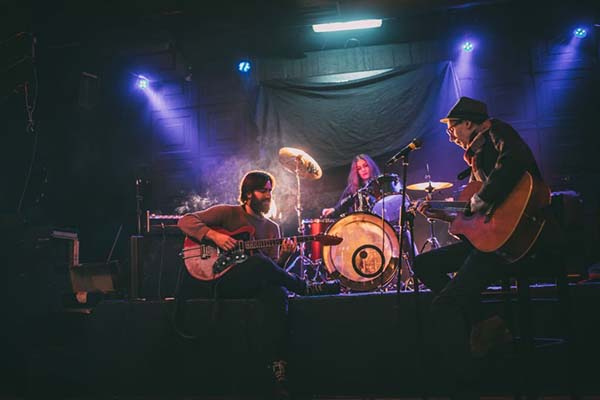
Oddly enough, after they closed the shop, I remained languished for a while and in limbo. I was able to reclaim the domain in 2005. I put together a team out of San Francisco who ran it from 2007, 2008 and 2009, whatever it was that we’d launched officially until we sold it to Barry Diller. I didn’t actively have involvement other than a board level for that second iteration but in hindsight, I should have run the thing and we would have done even better but that’s a different story.
You sold it. Was that when you started getting into podcasts?
I caught that bug around 2009. I had been doing real estate development from around 2000-ish. It was technically ’98 when I first did my deals but around 2000, I started getting involved with it more full-time. From 2006, 2007, 2008 and 2009, I developed about $50 million in real estate. Unfortunately, in the crash, I lost a few good properties. I had to give them back to the banks and that hurt.
I woke up one day in 2009 and was like, “I’ve been doing a lot of stuff that’s good for me and those closest to me but no one else. I need to figure out how to do some things that can help more people.” That’s when I started writing and started my first podcast episode of Reinvention Radio. I got the bug for podcasting, left it alone for a little bit and got back into it starting in 2015. I did a lot of events around podcasting and launched Podcast Magazine. It’s been a good track as far as podcasts are concerned.
You were able to impact more people through podcasts, real estate, deejaying and all the other things. It seems like you’ve progressed larger and larger.
That’s a safe way to put it. I’m in the process of trying to come full circle and see if I can impact more people through music. It’s interesting how things will come full circle like that.
What do you mean by impacting more people through music?
[bctt tweet=”Being a DJ is like being a conductor. You have the ability to impact and influence mindset and behavior based on your actions.” username=”whyinstitute”]
I’m going to be doing my music festival here at some point and may even get it off the ground here in 2022 but I’ll start deejaying again and get back into music because it’s part of who I am. It’s in my bones.
When we first got on the call and looked at you visually, I wouldn’t have any idea that it’s about helping make a difference and impact more people. I would wonder and make up my narrative around what I’m seeing, especially with coffins in the background. If I had realized those were coffins, I’m not sure where my mind would have gone. Did you get out of that coffin? Do you sleep in the coffin?
I couldn’t tell if you were in a hotel room or even where you’re at. There’s a curtain in the background and an open coffin with Steve right in front of it. I wouldn’t know what I was looking at but now that we hear more about your journey, it’s obvious that as you progress, you’re impacting more people. First, it was your family and then your college family. It kept getting bigger. Tell us more about the music festival that you’re looking to do.
It’s very much a work in progress. There are very few things that moved me in terms of impacting my soul. It’s where I feel I’m most alive. Outside of the relationship that I have with my wife and the fun stuff that we can do there, there are very few out-of-body type experiences that I have on an ongoing basis. When that music goes through my soul and you hear the music and get a sense of the rhythm and then the tribal beats or the vocal range of someone who can touch your soul with their voice, there’s nothing else like it.
The original name that I was coming out with for this was One Voice. The idea is it would be the One Voice Unity Festival. It’s all about raising our consciousness through expression, whether that’s through movement or voice but collectively, we are one voice that moves together. Humanity is intertwined much more so than many would like to admit what you do impacts what my life is like. There’s no denying that. Collectively, there’s nothing quite like being in unison with the crowd. That positive energy can change lives.
Most of us will never be a DJ on the big stage playing into a big crowd. Take us through what it’s like to walk out on the stage and start. I watched Bohemian Rhapsody and that’s not a DJ but in that giant stadium, watching Queen play is an emotional experience, even though we’re not on the stage.
It is very difficult to describe but I’ll do my best. It’s almost as if you were a conductor and you have the ability to impact and influence mindset and behavior based on your actions but in a way like if you’re having a conversation with a person and you break through with them and see them light up. It’s a beautiful experience but if you magnify that by 500%, 1,000% or 10,000%, there truly is nothing more magical than when a collective group taps into that same emotion and way of being. As the conductor, to be able to influence and orchestrate that emotional rollercoaster so to speak, it’s pretty powerful in ways that almost nothing else in life can compare to.
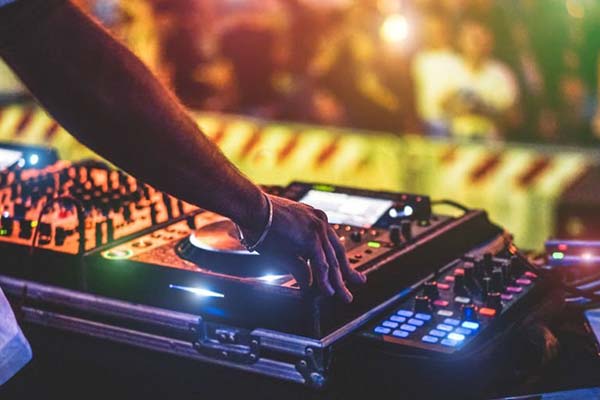
Are you taking your audience on a journey?
That’s exactly right. It’s an emotional cathartic full-body and soul journey and experience. There are thousands of great DJs out there who can do this but that’s why the best of the basket get paid what they get paid because it is a skill and an art. You talk about skill stacking and I’m sure you’ve heard the term where you take a lot of the things that you’ve done over the course of your career and you look back and go, “I can see how this is connected and how this helped me to do this.”
There’s also a stacking of innate abilities and understanding of who you inherently are and how you’re naturally wired to excel. You can’t teach someone how to be empathetic or have empathy. You have it or you don’t. You have it on various levels depending on the person. I’ve always been an empath and I can get a sense of how people are doing and what they might be struggling with. I can see through people’s bowls pretty quickly. My friends call me the truth-teller.
There’s a lot to be said for that on a level of deejaying and playing music because you almost have to have a sixth sense of where they are and what their mood is collectively. You’d be amazed at how a crowd can have a collective mood and be able to stand in a position of compassion and empathy and move them in a way that they need to be moved. As an empath and someone who has that unique ability to understand people, it lends itself well to the DJ booth.
Interestingly, we’re having this conversation because people have asked me that question, “When you’re speaking to a big audience, what is that like? How do you take them on the journey?” To me, speaking is the closest thing I know of to compete at a high level like sports. You got to prepare. You don’t know what’s going to happen. The show must go on. You got to feel your way along as you go. What I find very challenging is exactly what you’re talking about. How do you move them? What is it that makes the difference between the DJ that moves the audience and the DJ that’s playing a cool sound? What do you think is the difference?
The difference is number one, it’s like a comedian who tries to perfect their set. If you follow the comedic space at all, you know that oftentimes what the comedians will do is they’ll start working on stuff, have their material and bit by bit, they’ll show up at different places, see if they can get a little bit of stage time and start working it out. It’s like, “This worked well on paper,” but in reality, it didn’t land. They start working on it until they know their material from back in the center. By the time, these guys get to a Netflix special as an example. They are so dialed in with every piece of that. There’s nothing that’s left to chance. That’s a big part of it too in this world.
This is applicable to anyone. You can appreciate this. Big audiences start as small audiences. You don’t get an invitation to speak to 50,000 people or whatever in a stadium until you’ve spoken to 20 people 500 times. You can use your numbers on this but you get my point. It goes back to Gladwell and the 10,000-hour rule too. You have to put in the time but it’s also a matter of your speech or whatever you’re doing. You could be a salesman selling a particular product. It’s a matter of knowing your product and being able to overcome any objection and talk about that product like it’s a piece of who you are.
[bctt tweet=”You can’t teach someone how to be empathetic. You either have it or you don’t.” username=”whyinstitute”]
The other side of it too is knowing the music. A lot of the DJs do is pick pieces, components or elements of the music that may have a certain resonance to those pieces that aren’t the typical way that someone would play that song. They may take those pieces and splice them together and create their track using elements of that song that are the elements that move people. It’s a matter also of knowing the material is what I’m saying.
How much practice do you do to be who you are as a DJ? Is it an everyday thing? Is it a once every now and then thing? Is it a natural ability to know how things fit together and you don’t need as much practice? Are you saying, “I got to practice every day to be who I want to be?”
The answer is zero. This is why the act and the art of public declaration are so important because for me, I haven’t been in front of a crowd for many years since my wife and I last deejayed a wedding together. That was the last set of things that I did on the DJ side. My goal is to take the stage of my event. To do that, I got a lot of work to do. It’ll become an everyday thing for me here. The next time we talk, I’ll already have started that ritual.
How exciting. You’re getting to do what you want to do at a level that you never thought was possible. You are going to create it.
Part of the creation of doing the event is going to be getting back to honing the craft. It’s been a long time since I’ve put together selections and so on. I’ve got a pretty good ear for music and I always have but getting the selections dialed in and putting together my sets and starting to play smaller festivals. Before we’re going to do our thing, it’s like a room full of twenty people. I got to do 300, 400 or 500 of those before I can get to the point of feeling like, “It makes sense for me to have a stage of 3,000, 4,000, 5,000, 10,000, 20,000, 50,000 or 100,000 people.” There are a lot of smaller stages that I got to start planning.
Who are some of your favorite DJs? Who do you follow? Who has kept you interested in deejaying?
Back in the day, being from Chicago, I was interested in the whole world of Chicago house music, which has a very distinct soulful, melodic and vocal-based sound. When I first started deejaying, that’s all I would play but over time, I’ve become appreciative of a lot of the newer DJs who mix the best of what’s old and what’s new and then do their remixes of some of the material as well. The best guy that I follow who I have the utmost admiration for is a guy who goes by the name of Purple Disco Machine. He is a machine that tours everywhere. If I were to model someone from a selection perspective, he and I are aligned with what he plays.

I am going to look him up. I was asked on a podcast, “If you could only go see one group, who would you like to go see?” I said, Daft Punk because I would love to see them but they broke up. I don’t know if you ever got to see them but that’s who I would like to see.
It’s interesting too because, from an electronic standpoint, a lot of people don’t chalk them up to being artists. They push a button and dance around or do whatever but a lot of the guys, Daft Punk included, I never had a chance to see them other than some video stuff. They would create on the fly right there on the live set so no two live sets were ever the same.
A lot of crossover and similar things would take place because they would play along with the music and create on the spot. That’s something that a lot of people don’t do. We had a concert, a DJ and producer, his name is Worakls, was doing a lot of that live stuff as well. It’s super cool for the people that not only can DJ but can play an instrument and go along with it. It makes a cool experience.
Are you already starting to get nervous?
Not so much. I don’t get nervous about things. I’m going to have the opportunity to interview some pretty cool people at the magazine like the Paris Hilton’s of the world and some pretty awesome well-known people. I don’t get the nerves around that. I don’t get nervous around music. It’s something I love sharing.
How far off do you think your event is, the One Voice?
It’s about the public declaration. There are a couple of options. We can do something on a smaller scale. Doing smaller-scale events is something that we’ll do here in 2022. I’ll get 2 or 3 of those under my belt that I’ll throw some smaller events, bring a couple of people to hang out and do some music or something together.
[bctt tweet=”Take on activities that the ‘you of tomorrow’ can look back at the ‘you of today’ and give thanks.” username=”whyinstitute”]
We’ve got a lot of space here in the funeral home. We may end up doing something here, believe it or not. It’s like an event center or an event space. I’ve got 15,000 square feet here. We may do something here but in terms of a larger scale, One Voice Festival event that may have a couple of thousand people or more, that’s a 2023 thing so maybe for the summer festival season in 2023.
We haven’t even asked you about the obvious. How did you get into the funeral business?
My wife has been the Funeral Director and Embalmer for many years. She’s the one who’s been in this industry. She’s a licensed Managing Funeral Director and Embalmer. She’s known from a very young age. This is what she wants to do. She went back to school when she was younger than 40 but roughly around that time to get a degree in Mortuary Science after having been a Chicago public school teacher and then raising our kids and staying home with our kids for a couple of years.
Towards the end of that, she was like, “I want to do this thing in the funeral industry.” She got her degree and started working for some of the bigger corporations. It was time for her to have her place. I’m here doing my best to help her. It’s an interesting business because it’s not like you open a shop and everybody starts running in here. It’s a different scenario of getting the phone to ring. There are a lot of opportunities here as well. Going back to the skill stacking, you take a look at what I’ve done in the online world, marketing, PR, podcasting, live events and so on. There are a lot of things we can do to help leverage those skills that have been acquired over quite a bit of time and apply that to this world.
Last question, what’s the best piece of advice you’ve ever given or gotten?
The best piece of advice that I’ve ever given simply boils down to reminding people that you want to take on activities that the you of tomorrow can look back on the you of now and give thanks for those actions taken. That’s about understanding the concept of yeno, which is a fancy way of saying yes no and recognizing that almost every moment represents a moment of truth where you have to be consciously aware of what you say yes to and no to.
Your ultimate idea here is to stack those yeses in a way that leads you towards whatever those defined goals and objectives are. Ultimately, you want that version of yourself to be able to look back and say, “Thanks for doing the hard work, putting in the time with the missus, poaching the kid’s football team,” or whatever it is to be able to look back and give thanks. That’s the best piece of advice that I consistently give to people.
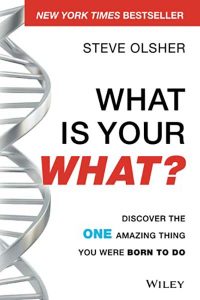
In terms of the best advice that I’ve received, it is a bit of advice that my grandfather gave me back in the early ’90s, around ’91 or ’92 before his passing. We were thinking about selling a piece of business and I asked him, “Is this what you want to do? You don’t want to hold on to this?” He said, “In business, we don’t build monuments.” His point was we’re not looking to create something that we have to hold on to forever. When the right opportunity comes along, you take that opportunity and move on to the next thing, whatever that next thing might be.
That wasn’t the last question. I got one more last question. What is it that keeps you going and wanting? It is not a little finger about to take on.
The fact is I’ve been doing Brazilian jujitsu for many years. One of the things that I always say is, “You can have all the technique in the world but at the end of the day, you can’t teach twenty-year-old strength.” It’s there or it isn’t. For me, it’s about movement and keeping in motion because with movement, energy is created. You have to stay moving to stay fresh, vital and able to have the energy to keep going.
There are a lot of reasons why it’s easy to say no to doing the hard work. It’s a lot easier to find a reason to say no most of the time than it is to find a reason to say yes, especially as you get older. What keeps me going or driving is not only movement through jujitsu, running, taking supplements and getting your hormones checked, especially if you’re an older guy or gal and making sure that’s stuff in line.
The other thing that I do believe in is understanding the whole concept of five-year windows. I try to live within the timeframe of those five-year windows, understanding that to get something built to the point where it has any meaningful traction, you’re probably going to be dedicating five years of your life to it, especially when you’re an entrepreneur.
Understand that if you go full out for those five years, good things can happen. The older you get, the fewer five-year windows you have. You have to be a lot more selective about what those five-year windows are but a big part of it as well is understanding, “This is a five-year window play. I need to go all in and do whatever I can do to make this thing work.” The combination of those things does help.
Steve, thank you so much for being here. I enjoyed getting to know you and hearing your stories. You got a lot of great stuff you’ve already done. I can imagine that your One Voice is going to be something amazing when it finally hits the biggest stage. Let me know and I’ll buy some tickets and be out there.
I still have the real estate bug so I got one more good real estate trick up my sleeve, something that’s going to change the game in terms of the market here because it’s been a pretty archaic system for a long time. The opportunity to disrupt the world of real estate and finally give people another option other than we’re owning or renting is well overdue. When we get up and running, we’ll come back and have another chat.
Steve, if there are people that are reading that want to follow you, learn more from you and be part of your podcast empire, how should they get ahold of you?
Subscribe to Podcast Magazine, PodcastMagazine.com/Free is the best place to go to get a free lifetime subscription and pretty much all the channels. I’m @SteveOlsher.
Thank you so much for being here. I appreciate it.
—
For our last segment, it’s time for Guess the Why. I’ve been watching the documentary about Elizabeth Holmes and Theranos. If you’ve had a chance to watch it, it’s called The Dropout. I’m curious to know what you think her why is. I have a sense of what it is and the people that she’s followed and the people that she wanted to be like, which were people like Steve Jobs and Richard Branson.
I believe that Elizabeth’s why is to challenge the status quo and think differently. She’s not going to follow the rules or do it like anybody else. She’s going to think outside the box, see things the rest of us don’t and push the limits and people like what Steve Jobs did. Watch her movie and let us know what you think but that’s what I think about being able to watch the documentary.
Thank you so much for reading. If you’ve not yet discovered your why, you can do so at WhyInstitute.com with the code PODCAST50. If you love the show, please don’t forget to subscribe below, leave us a review and rating on whatever platform you’re using so we can bring this to more people. I will see you next time.
Important Links
- Podcast Magazine
- ClubPod
- Liquor.com
- What Is Your WHAT? Discover The One Amazing Thing You Were Born to Do.
- New Media Summit
- Reinvention Radio
- @SteveOlsher – Instagram
- PodcastMagazine.com/Free
- WhyInstitute.com
About Steve Olsher
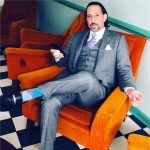 Founder/Editor-In-Chief of Podcast Magazine, Creator of ClubPod (the largest podcast group on social media), NY Times bestselling author, keynote speaker, Original Founder of Liquor.com, and the host of the top-rated podcast Reinvention Radio.
Founder/Editor-In-Chief of Podcast Magazine, Creator of ClubPod (the largest podcast group on social media), NY Times bestselling author, keynote speaker, Original Founder of Liquor.com, and the host of the top-rated podcast Reinvention Radio.

